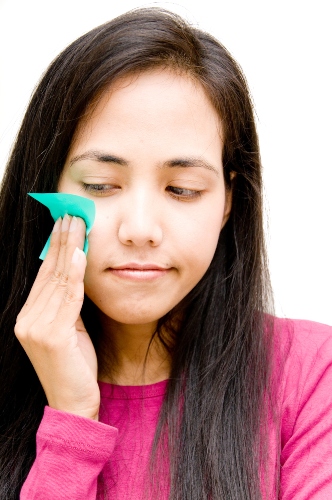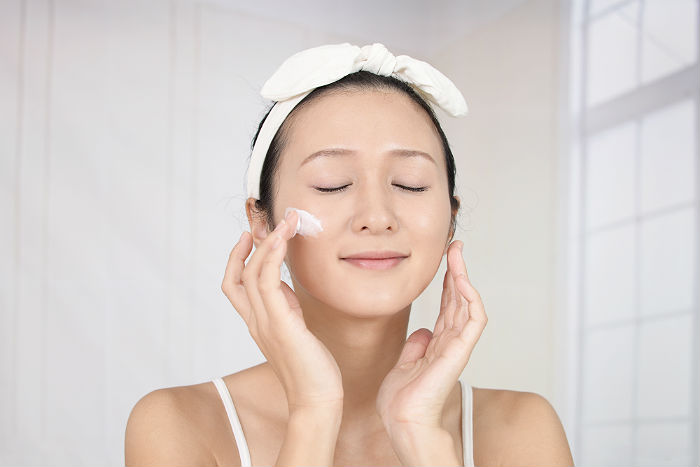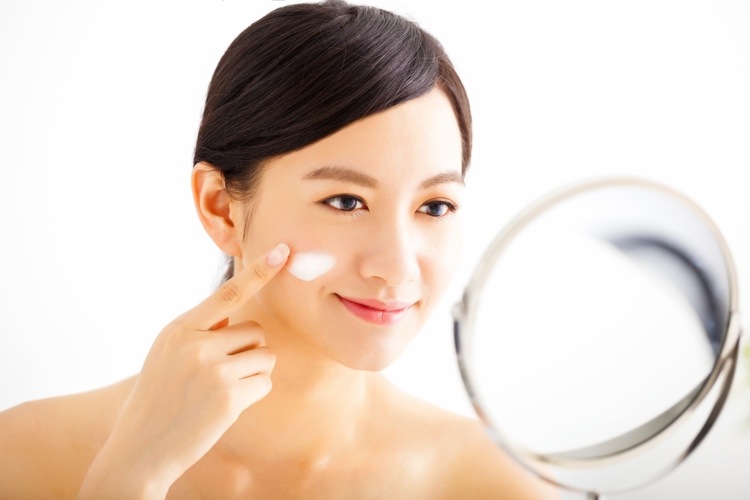Have you ever bought a product that others absolutely raveeeee about, promises to be your new holy grail, gets you hyped up about the wonders it could do for your skin… only for it to do nothing to your skin, or worse, cause your skin to act up?
It’s possible that you might’ve categorised yourself under the wrong skin type, something dermatologists and aestheticians say is much more common sight than you would think.
This, in turn, causes you to use wrong products. For instance, using a face wash for dry skin on someone with oily, acne-prone skin is going to invite skin troubles.
First, let’s go through the basic skin types, which consists of: dry, normal, combination, oily, and lastly, sensitive.
To be able to tell what skin type you have, we’ve asked aesthetic doctors who work with patients with different skin concerns, on easy, fool-proof ways on identifying your skin type (correctly).
How to identify your skin type?
1. Looking at the size of pores

Source: Pinterest
Dr. Kenneth Thean, from ENSOUL Medical Clinic told us one fool-proof method: by looking at the size of the pores.
“People with oily skin tend to have larger than usual sized pores, followed by normal skin, then lastly, those with dry skin, with invisible pores,” he said.
Still can’t tell?
He adds: “Those with oily skin tend to have more blackheads and pimples all over the face, and because their pores are larger than usual, this means that their pores are more open, allowing oil and dirt to clog up more easily.”
On the other hand, it means that those with combination skin will often have blackheads and pimples appearing only in the T-zone area, where the pores are larger and people with normal and dry skin are less acne-prone.
2. Amount of oil throughout the day

Dr. YX Lum, from IDS Clinic, suggested careful observation of the skin’s reaction during the day, such as the level of oil on the face.
She said: “In combination skin, you may notice that the skin is oily in the T zone but the rest of the skin is relatively normal in balance of the oil.”
“In oily skin, you may notice that the skin is uncontrollably oily; in dry skin, the skin often feels tight and there may be peeling or cracking of the skin during the day; in sensitive skin, the skin often gets red, and itchy easily.”
Perhaps if you aren’t sure how to go about quantifying the amount of oil – Dr. Thean added that one could simply observe the amount of “shine” on areas of the face.
3. Staggering the usage of new products

Dr. Georgia Lee, from TLC Lifestyle Practice suggested staggering the usage of new products – in other words, some careful observation of your skin’s reaction when using new products, such as by simply cleansing your face.
Sounds easy enough, doesn’t it?
She said: “For example, if one uses an oil control cleanser but only certain areas feels tight and dry – then those areas may need moisturiser, a richer type of moisturiser or just use a sensitive, soap free cleanser and add on the oil control on suitable areas.”
Do you really have sensitive skin?

Dr. Lee mentioned that identifying natural sensitive skin was probably the hardest, and that it was common for people to mistake themselves as having sensitive skin.
She explained a key difference: “People with sensitive skin tend to have thinner skin, and flush more easily. Sensitive skin is also acquired genetically with a predisposition to skin conditions like eczema, psoriasis, and rosacea.”
On the other hand, people who often mistakenly categorise themselves as having sensitive skin often have what is termed sensitised skin, which is acquired through lifestyle and environmental factors such as “exposure to extreme temperatures, unprotected sun exposure, skincare that is too harsh for the skin, over treatments with lasers”.
While sensitive and sensitised skin may appear similar on the outside, with similar effects, they require different treatments – sensitive skin requires gentler products with few ingredients, whereas sensitised skin only requires “sensitive” geared products temporarily in order to rebuild the damaged skin barrier, before it reverts back to its original skin type.
4 most common mistakes made in facial routines, according to experts
Underestimating sun damage

“Many people don’t realise the impact of sun damage on their skin,” Dr. Thean told us. “People should use a sunscreen of SPF 50 which will filter out 98% of the sun’s UV radiation – anything stronger does not provide much more protection and will add unnecessary chemicals to the skin.”
“It should also be reapplied frequently, at least three times on a normal day – at 9am, 12pm and 3pm. More frequent application is needed when outdoors and exposed to direct sun, and reapply immediately after swimming or perspiring heavily.”
Oops. Guess we ought to be bringing our sunscreen out with us next time then, to get the optimal sun protection!
Using the wrong types of moisturiser for your skin type

“A lot of people with oily skin have this perception that they need to moisturise a lot as it will help them reduce oil production, which is actually just a misconception,” Dr. Lee told us.
For those with combination skin types – that means, dry skin in some areas, and oily in others – she advises layering moisturisers. What this means is that you should apply a thinner textured one on less dry areas, and thicker one over the drier areas.
For people with sensitive skin, Dr. Lum advises, “It would be wise to use moisturisers that have special technologies to help hydrate further such as products like Cetaphil Restoraderm to ensure that they do not contain any harsh ingredients.”
FYI, Cetaphil Restoraderm is a skin restorative moisturiser that is gentle enough and suitable for those with sensitive skin.
Washing your face too many times in a day

“Many people with oily skin also make the mistake of washing their face too many times in a day, or using an overly strong cleanser that breaks down the skin barrier, causing more dirt to go in, and hence, more pimples, and more clogged pores,” Dr. Thean told us.
Acne does not reflect health in other organs

“The most common [misconception] will be acne patients telling me how acne in certain areas of the face reflects a disease in another particular organ, Dr. Lum shares.
“For example, they would say the forehead acne represents a problem with the liver. It’s totally unrelated and untrue,” Dr. Lum told us.
Yet another myth busted!
Tips according to each skin type, for an optimised skincare routine
Sensitive skin

Dr. Lee suggested the following tips for sensitive skin:
- Use fragrance-free and alcohol-free products
- Try to use products with as little ingredients as possible
- Avoid spicy foods, alcohol and caffeinated drinks
- Take foods high in omega 3 and oral probiotics
- Use a gentle cleanser and try not to exfoliate if skin is too sensitive
On the other hand, Dr. Thean suggested keeping a skin diary to monitor reactions to different products, as well as food, so that allergic reactions can be controlled in the future.
Oily / Combination skin

Dr. Lee made the following suggestions for those with oily skin:
- Exfoliate skin at most once or twice a week
- Use oil-free products and an alcohol-free toner
- Avoid moisturiser on areas which are particularly oily (especially gel types)
- You can use toners and essences with Salicylic acid, or Benzoyl Peroxide, which help to unclog pores and rid of black and whiteheads.
Dry skin

For those with dry skin, Dr. Thean suggested limiting time in in the shower or bath, and to use warm instead of hot water, as doing so could dry out the skin even more.
Meanwhile, Dr. Lee suggested the following:
- Avoid foaming cleansers as they tend to dry the skin out more
- Use an alcohol-free toner
- Moisturise dryer areas more
- For those with mature skin, try to find products with anti-ageing properties such as cream-based products rich in Vitamin E
The experts we spoke to
Dr. Georgia Lee

Armed with extensive experience and credentials in dermatology and aesthetic medicine, Dr. Georgia Lee started her own practice in 1999 and has since earned a reputation for being a top celebrity aesthetic doctor.
She now practises at TLC Lifestyle Practice, and has also launched her own cosmeceutical skincare brand, DrGL. Dr. Lee also runs a combined spa experience, DrSkin and DrHair, located at Tangs Beauty Services on Level 4, which provides facial treatments and hair loss solutions entirely with DrGL products, or methods approved by Dr. Lee herself.
TLC Lifestyle Practice
Address: 9 Scotts Road, #11-04/05, Pacific Plaza, Singapore 228210
Telephone: +65-6462-0083
Opening hours: Mon & Sat 8am to 4.30pm, Tue to Fri 8am to 8.30pm, closed on Sun and PH
For appointments: [email protected]
Dr. Kenneth Thean

Dr Kenneth Thean is the Medical Director of ENSOUL Medical Clinic, and has been a practising medical doctor for almost 37 years now. He has post-graduate fellowships from the Royal College of Surgeons of Edinburgh and the Royal College of Surgeons and Physicians of Glasgow, and was a former administrator of the National Skin Center.
His passion for aesthetic medicine has led him to gain knowledge from experienced counterparts in Korea, USA, South America, Malaysia, Thailand, Australia, and Singapore. He regularly conducts regional training sessions for other aesthetic doctors, and was previously the Global Chief Medical Officer for a regional chain of aesthetic clinics.
ENSOUL Medical Clinic
Address: 360 Orchard Road, #08-01 International Building, Singapore 238869
Telephone: +65-6836-2833 / +65-8798-2892
Opening hours: Mon – Fri 10am to 8pm, Sat 10am to 5pm, closed on Sun and PH
Website: ENSOUL Medical Clinic
For appointments: [email protected] or by contact form here.
Dr. YX Lum

Having graduated from Trinity College in Dublin with a Bachelor of Medicine and Bachelor of Surgery degree, Dr. YX Lum went on to earn various graduate diplomas and certification for aesthetic medicine. Having once battled with acne and breakouts herself, Dr. Lum has since had a strong interest in acne treatment, and innovating products and treatments for the condition.
Dr. Lum is currently part of the team of doctors running IDS Clinic, specialising in skincare solutions from Botox® fillers, laser treatment, to simply acne prevention.
IDS Clinic
Address: 8 Sinaran Drive, #05-07 to 10, Novena Specialist Center, Singapore 307470
Telephone: +65-6568-3555
Opening hours: Mon – Fri 10am to 8pm, Sat 10am to 5pm, closed on Sun and PH
For appointments: Through the form on their website


